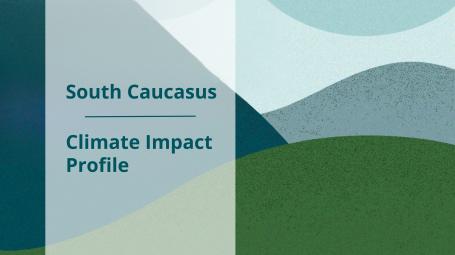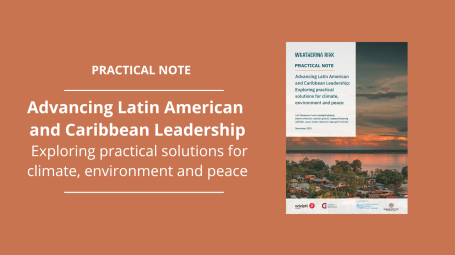Analysis & Foresight
Why it matters:
The climate crisis poses a real, urgent and pervasive risk to peace and stability in all contexts of the world. Failure to understand and address interacting climate and conflict risks will undermine the sustainability of both peace and climate policies. Weathering Risk offers tailored analysis and tools, state-of-the-art climate impact data and expert conflict analysis to understand climate-related risks to human security in order to build sustainable peace.
What we do:
We develop analysis, tools and trainings grounded in geographically and thematically focused climate security risk assessments. With these, we facilitate risk-informed planning, enhance capacity for action and improve operational responses that promote climate resilience and peace.
How is Weathering Risk innovative?
- People-centred analysis that is intersectional and gender-disaggregated
- Focus on context and actor specific entry points
- State-of-the-art spatially disaggregated climate impact data and analysis
- Tailored to needs of specific policy makers and practitioners
- Combines qualitative + quantitative research, PLUS uses scenarios and innovative superforecasting, not dependent on historical data
We support policy makers and partners through:
- Assessments
As well as producing assessments, Weathering Risk also provides policy makers and implementers with an easily applicable climate-security risk assessment approach to conduct their own analyses of climate-linked conflict risks and responses. The approach has been piloted and refined over three years and across different regions to ensure relevance and usability.
View all Weathering Risk assessments and publications
Through collaborations with partners such as UN agencies, multilateral organisations, national academics and civil society, we produce locally and contextually grounded analysis focused on select regions. Our outputs are tailored to stakeholders’ needs and span the diplomacy, development, defence, humanitarian aid and climate communities. For example:
- in partnership with the African Union, Weathering Risk produced the first ever African Continental Risk Assessment
- in partnership with UNDP and the Pacific Islands Forum, we produced climate security risk analyses
- in partnership with UNDP and CGIAR we produced roadmaps for climate-security resilience for the Arab States region.
- our Mali analysis offers specific guidance for the UN Multidimensional Integrated Stabilization Mission in Mali (MINUSMA).
- Capacity support tools
Weathering Risk turns strategic uncertainty into manageable risk and contributes to informed decision making. We identify the right questions to ask and how to make use of the available information.
Our focus lies on enhancing capacity for action, improving risk informed planning, and advancing operational responses. Our work supports processes such as UNFCCC, COPs, the G7 and UN Security Council by, for example, providing analysis to inform briefings and shape the agenda.
Our replicable assessment methodology is being used by peacebuilding partners on the ground in Somalia and Iraq and is included in the new UN Resident Coordinators handbook. We are also working with national intelligence experts to develop a strategic foresight game using our risk analysis. The game helps high-level decision makers formulate strategies that respond to climate security risks in a given mission setting, supporting a deeper understanding of the issue as well as what action on the ground looks like.
- Dialogues and training
Weathering Risk works to convene, connect, and bolster the growing community of practice on Climate Security. Using our analysis to inform the discourse, we initiate timely, politically pertinent discussions, for example the Climate Security in 3D dialogue series, key climate security fora including the Istanbul Security Conference, Aswan Forum, Dakar Regional Conference on climate, peace and security, World Bank Forum, Environmental Peacebuilding Conference, Geneva Peace Week —and the first ever ministerial roundtable on climate and security at COP26 in Glasgow. To support translating dialogue into action, we draw on our analysis to develop tailored trainings that support policymakers and implementing partners in integrating climate security risk analysis into strategic and operational processes.
Who:
The Weathering Risk initiative is led by adelphi and supported by a range of governments and partners, including a variety of research institutes from around the world.
Read more about our partners, Strategic Advisory Board and meet the team.
Where:
Weathering Risk projects in the first two years of the initiative spanned the African continent, the Pacific, Tuvalu, Kiribati, the Republic of the Marshall Islands, Yemen, Jordan, Iraq and Somalia. New projects in 2024 and beyond will expand to new geographies and regions. The initiative also provides policymakers and implementers with an easily applicable methodology to conduct their own analyses of climate-linked conflicts that can be used in any geography, region or country.
Share on




